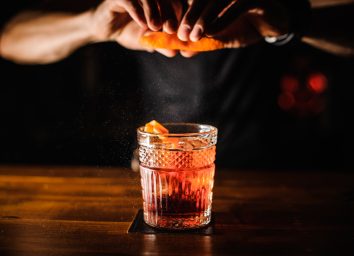One Side Effect of Drinking "Good" Wine, Says New Study

If you enjoy drinking a glass of wine every now and then but wouldn't go as far as to describe yourself as an oenophile, buying wine can all too often feel like a crap-shoot. After all, most regular wine shoppers—myself included—care little about things like acidity, yeast strains, tannins, soil, and provenance, and are far more concerned about two things: the color and the price. The taste? Most of the time, we're simply hoping for the best.
Savvier non-wine snobs, meanwhile, may know a few handy tricks for spotting good wine, such as inspecting the deepness of the punt—the concave indentation on the bottom—which some wine experts say is a surefire sign that it's a better-quality bottle and therefore contains higher-quality wine. (Inversely, some say, a shallow punt or flat-bottom bottle may be associated with lesser quality wines.)
But according to a new study published this month in the journal Food Quality and Preference, if the price point of the wine is the biggest factor you consider when you're buying wine, you may be inadvertently affecting your wine-drinking experience in ways you didn't know. The study concludes that those who think they are drinking a more expensive bottle actually think it tastes better and have a more enjoyable experience.
For the study, researchers from the University of Basel, Switzerland, conducted wine tastings for 140 study participants in which they served three types of 2013 vintages: a Montepulciano d'Abruzzo DOC ($10/bottle), a Bolgheri DOC (roughly $34), and a Toscana IGT (roughly $70). Many of the participants were shown the real prices while other participants were given the lowest price for the most expensive wine, and vice versa. At the end of the study, those drinkers who experienced the cheapest wine at an inflated price enjoyed the wine far more than those who were given the correct pricing information.
"While pleasantness ratings did not differ for open and no-price information, deceptive up-pricing of low-price wine significantly influenced ratings for pleasantness," write the authors. "In wine may lay the truth, but its subjective experience may also lie in the price."
It's probably no surprise that past research has shown that the same psychological side effect applies to purchases that extend beyond wine. In 2014, a study conducted by researchers at Cornell University found that diners rated a restaurant buffet meal much higher when the bill was higher. In a 2005 study of painkillers published in the Journal of Marketing Research, study participants took the same painkiller, but the research showed that those who thought it cost more actually seemed to experience more benefits.
In the case of wine, however, it's worth noting that the psychological side effect only works one way. While up-pricing made people experience the wine in a more positive light, "deceptive down-pricing of high-price wine had no effect on pleasantness ratings," say the researchers. In other words, cheap wine with a bigger price tag tastes better than cheap wine at a cheap price, but good wine with a cheaper price tag is still good wine. And if you're a wine drinker who loves a great cabernet or pinot noir, make sure you're fully up to speed on The One Major Side Effect of Drinking Red Wine, Says New Study.








